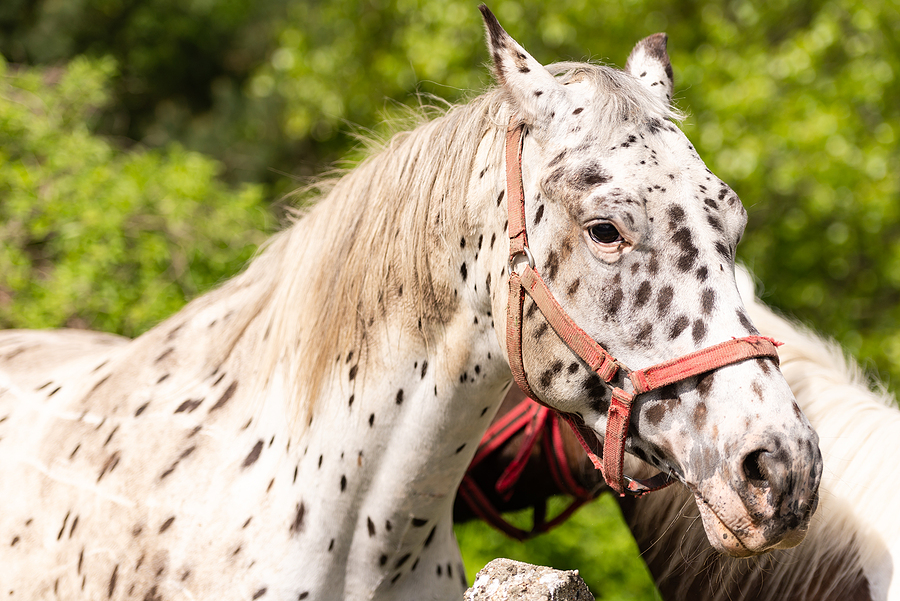One of the best things about equine family members is that they often live well into their twenties. That means we need to be very aware of senior horse health problems and care.
Gerontology is a “hot” science for dogs and cats. Horses lag a tad behind, but they are catching up. When is a horse a “senior”? Twenty is the age that is consistently used, but to a certain extent, age is an individual thing. A horse may be chronologically young but physiologically older if he has had health problems along the way. Ponies also tend to defy the “senior” label and are often active well into their thirties.
So, what do you need to be concerned about? “I think the biggest thing is realizing that senior horse needs will change as they get older and owners will need to adapt. Close monitoring and early recognition of problems is always better than reacting only when things get really bad,” says Katharyn Mitchell, BVSc, DVCS, DVM-PhD, a large-animal internal medicine specialist and assistant professor at Cornell University College of Veterinary Medicine.
Joint Concerns
As with older house pets and people, arthritis can limit an older horse. Excellent joint supplements are available that can be added to your horse’s daily meals. Reducing your chubby gelding’s weight can mean easier movement and comfort for him.
Dr. Mitchell stresses that some light exercise, if your horse is capable, helps to keep them active, agile, and flexible, as well as maintain muscle tone. They may not be up to doing a 100-mile endurance ride or galloping around a cross-country course, but your senior would probably love a quiet hack on some nice trails or even an amble around the pasture.
This is a good time to explore hands-on help such as TTouch, massage, and laser therapy. While these can’t reverse aging, they can help to keep a horse comfortable well into his senior years.
Sensory Decline
Senior horses may have some vision and hearing loss. Both veterinarians and horse owners should keep that in mind when they approach or work with an older horse. Keep in mind the Fear Free goal of reducing fear, anxiety, and stress. If your horse is blind or visually impaired on one side, try to approach from the other side. Speak as you come up, so he hears you (assuming he is not deaf). A gentle touch can be a way to alert him but don’t do a quick poke! Use a long stroke instead. Have an opened peppermint in your hand since the sense of smell is usually intact.
If hearing is a problem, make sure you come into his visual field before you touch him. You can experiment to determine what sounds your horse may still be able to hear. If your yell doesn’t get him coming from the back field, try a whistle. Smart management can compensate for many failing senses.
Weight and Dental Care
Some of the main health problems seen in older horses include keeping weight on, chronic problems such as recurrent impactions or equine asthma (heaves), and the classic endocrine problems of EMS (equine metabolic syndrome) and PPID (pituitary pars intermedia dysfunction, or equine Cushings).
Regular wellness care includes checking your horse’s dental status. Many older horses have dental problems that can contribute to weight loss and difficulty maintaining weight. Your horse may need to switch to pellets for forage as opposed to flakes of hay to get the most nutrition from his daily feed. Regular deworming is important, too.
While many horses benefit from added calories in winter, it is especially important to keep senior equines well fueled. Use of a blanket as needed can also help, but be sure to remove the blanket daily if possible, to groom and accurately assess how your horse is holding up. If you don’t trust your eye, use a weight tape weekly.
Preventive Care
Mitchell emphasizes that it’s important for your senior horse to receive regular wellness checks from your veterinarian. These are opportunities to look for and manage any dental disease, pick up early signs of metabolic disease, get appropriate dietary advice, and monitor for any cardiac diseases that develop or worsen with age. It’s also important to think about your horse’s wellbeing in a compassionate and clear-eyed manner, especially if there are seasonal considerations.
“I recommend owners really reassess every fall how their older kids are doing and make the tough calls if someone isn’t doing well; it’s better to say goodbye when things are still relatively okay rather than when they are having a crisis in the middle of a cold winter morning, getting down and not being able to get up, slipping on ice, or choking on hay because their teeth are no good anymore.”
What Can You Do?
- Stay on top of your horse’s gastrointestinal health. Is he eating normally? How is his weight? Is he drinking as usual? Is he chewing his hay or mouthing and dropping most of it? Does his manure look normal and is it being passed in normal amounts?
- Do a whole body “feel over” at least once a month to look for new lumps or bumps, feel for weight, especially if he has the long haircoat of a horse with PPID, and check for any tender areas.
- Watch your horse move at a walk and at a trot. See if he is still comfortable turning both ways.
- Make sure he has compatible turnout buddies.
- Consider massage, extra bedding, a new blanket, and more long walks outdoors.
This article was reviewed/edited by board-certified veterinary behaviorist Dr. Kenneth Martin and/or veterinary technician specialist in behavior Debbie Martin, LVT.
Deb M. Eldredge, DVM, is a Cornell graduate and the first recipient of the Gentle Doctor Award. She is an award-winning veterinarian and writer.
Want to stay in the loop on the latest and greatest in keeping your pet happy and healthy? Sign up for our free newsletter by clicking here!








